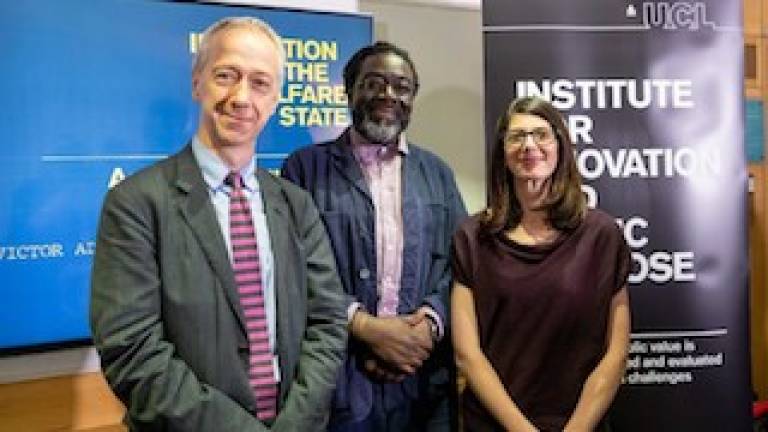Opinion: The complexities of tackling inequality and access to knowledge through the welfare state
4 June 2019
Dr George Dibb argues that to truly change the way society accesses knowledge and remedies inequality, we need action not just across the welfare state and the public sector, but also in the private sector.

Dr George Dibb - Head of Industrial Strategy & Policy Engagement, UCL Institute for Innovation and Public Purpose & UCL Public Policy
This blog was originally posted on the UCLIIP Blog and is reposted with permission.
At a recent UCL Institute for Innovation and Public Purpose (IIPP) and British Library’s public lecture, Access to Knowledge and Inequality, I was struck by an anecdote from Chief Executive of the British Library, Roly Keating. The BBC is heading for its centenary in 1922, however this date does not mark 100 years of the public service broadcaster we know today, but rather 100 years since the founding of a private corporation by a consortium of radio manufacturers. After five years of operation, the BBC and its owners under the managership of Lord Reith, realised the vast powers of control over access to knowledge under their monopoly. This drove a rethink of the BBC’s mandate which transformed it from a private corporation to something public, something shared and something much more valuable. What struck me about this anecdote throughout the discussion was that to truly change the way society accesses knowledge and remedies inequality, we need action not just across the welfare state and the public sector, but also in the private sector.
Madeleine Gabriel of Nesta presented the findings of a recent report, ‘Imagination unleashed: Democratising the knowledge economy,’ which stated our economy, starting with frontier firms but spreading across the private sector, is increasingly shifting to being a knowledge economy. In this regime, knowledge (and, implicitly, access to it) are essential for the means of production, distribution, and exchange. This shift has had profound effects on behaviours: in the mass production era, there was a rigid divide between designers, inventors, and workers, which is less true in the knowledge economy. Also, in this mass production era, workers often lacked any degree of autonomy in their jobs — this is rarer in the modern knowledge economy. This drive towards individual autonomy and knowledge does not only present fundamental questions of how we can ensure that the abilities and opportunities to develop knowledge must be distributed equitably. We must also look at ownership structures in the private sector because applying the ownership structures of the mass production era to a modern Google-fied economy cannot work.
Lord Victor Adebowale came at the issue from a different perspective, critiquing the paradoxical nature of our knowledge economy where those who have the greatest need for access to knowledge are often those with the least access to it. This paradox is replicated across our society, from social care in old age to libraries and computers. The welfare system in the UK is plagued by assumptions — the assumption that all users of doctors’ surgeries will have access to smartphones, the assumption that everyone has access to low-cost and accessible transport. We must clearly rethink the assumptions of the welfare state at a fundamental level, that not only takes into account a consideration of public value (see IIPP policy brief ‘Getting serious about value’) but also thinking about how these services can be delivered in an equitable way.
I was also struck by the discussion around the complexity of the topic, ‘Access to Knowledge and Inequality’, itself. Both are rapidly shifting. The means in which individuals generate, share, create knowledge and data, and the ways in which the data and individuals themselves function in the economy are changing in ways no one imagined. Our conceptions of inequality are changing, introducing concepts of intersectionalities. But can this discussion be addressed by looking at the public sector alone? It prompts the question of what is the purpose of government intervention in this space? Is the state simply there to provide services (and access) that the private sector won’t? Or must we think of a new form of public-private collaboration?
But taking this full circle back to the tale of the BBC reflecting on its status and monopoly of news and framing its own mandate in a new way around public value, can we imagine a knowledge business today doing the same thing? Can anyone imagine Facebook volunteering to break up their business to prevent monopolistic hoarding of personal data? Is Google going to offer to reinvest a large proportion of their profits (like at Bell Labs in the 1950s) to reflect the knowledge embodied in citizens through public education that their business is based upon? Unless we stop thinking about simply tweaking the behaviours of the public sector and think economy-wide about how government’s need to make a ‘new deal’ with the private sector to reflect the nature of our knowledge economy, we will never confront the structural nature of inequality in our economy.
Watch the full Access to knowledge and inequality talk with Roly Keating, Lord Victor Adebowale and Madeleine Gabriel below.
> More on Exploring Inequalities
 Close
Close

